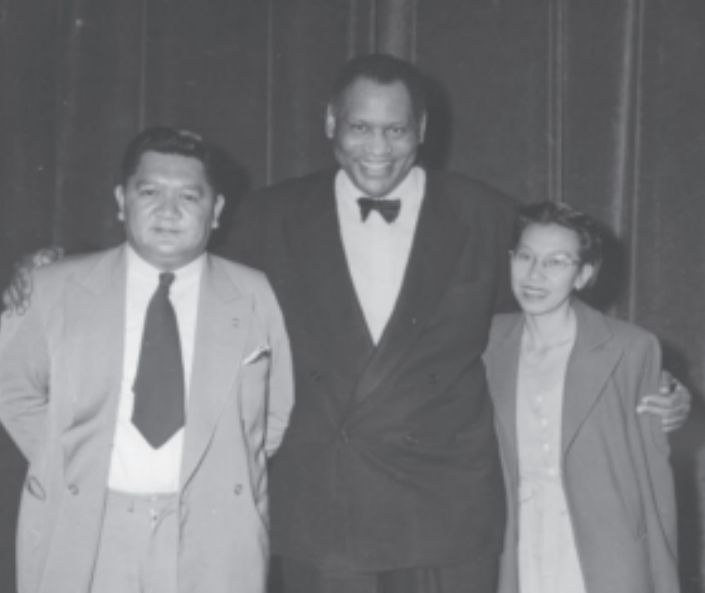
ILWU longshoreman and union organizer Joe “Blurr” Kealalio, actor, singer, and trade union activist Paul Robeson, and Ah Quon in 1948.
Ah Quon Leong was born on December 15, 1915. She overcame the hardship and difficulty of growing up the second youngest of a poor, immigrant family in Hawaii. Her father died when she was five, leaving her mother to raise the family. Her older brother stopped going to school to help support the family. All the children would help by collecting kiawe beans, dried bones and scrap metal to supplement the family income. They even made and sold charcoal to help support the family.
Despite the financial hardship, Ah Quon was able to acquire an advanced education—graduating from the University of Hawaii in 1938 with a degree in sociology and anthropology and later attending the University of Michigan in social work. But, instead of using her education for her own financial gain, she dedicated her energy, skills and knowledge to help others.
She worked first as a volunteer and then as a full-time social worker with the Hawaii Territorial Board of Public Welfare from 1938 to 1946, where she organized an industrial association that won raises for professional and clerical workers. She did volunteer work for Hawaii’s struggling labor movement, using her social work training to help workers and their families during the 1938 Inlandboatmen’s Union strike and victims of the 1946 tsunami which devastated Hilo.
It was during this time that Ah Quon met and married Robert (Bob) McElrath, who was helping Jack Hall publish the Kauai Herald and organize sugar and pineapple workers. In 1942, Bob got a job as a machinist at the Inter-Island Steam Navigation Company dry-dock in Honolulu, where he organized the independent Marine Engineering and Dry Dock Workers Union of Hawaii. Bob and his union organized workers at Hawaiian Tuna Packers, the American Can Plant, and the Hawaiian Pineapple Company (Dole cannery). Ah Quon was actively involved in helping to organize pineapple workers. Many of the organizing meetings with workers were held in the living room of the McElraths’ home on Elm Street in the old Sheridan Tract.
In 1945, the dry-dock and pineapple workers voted to affiliate with the ILWU as Local 150 and Bob was named the information director of the ILWU. [Bob McElrath ran the union’s radio program, negotiated contracts, and was appointed as the ILWU’s Regional Director in 1969 when Jack Hall was elected as the International ILWU vice-president. McElrath retired in 1978 and passed away in 1995.]
In 1946, Ah Quon did volunteer support work for ILWU members during the 1946 sugar strike which involved 26,000 workers and tens of thousands of their family members. She helped survey and assess members’ needs, helped organize the union soup kitchens to provide thousands of balanced and nutritional meals, and helped members with a wide variety of medical and social problems. The successful organization of sugar workers, based on racial unity, laid the foundation for Hawaii to evolve into a modern, democratic society.
Ah Quon continued her work with the union during the 1947 pineapple lockout and again in 1949 during the longshore strike.
When amidst anti-communist hysteria of the 1950s the “Hawaii 7” defendants were accused in a Smith Act case of teaching the overthrow of the government by force and violence, Ah Quon was office manager for their defense. In fact, this was an attempt to break the ILWU, which failed.
In 1954, the ILWU finally started paying Ah Quon for her work and hired her to provide social services to union members, mostly immigrants. She helped them with the medical and health benefits they received as a collectively bargained benefit. She also worked with the union’s growing elderly population of single, Filipino plantation workers, helping many of them return to the Philippines when they retired.
Ah Quon believed in training and developing union members to help themselves and their fellow workers. She worked with the ILWU’s membership service committees composed of worker volunteers who would counsel other workers and refer them to the appropriate social agencies.
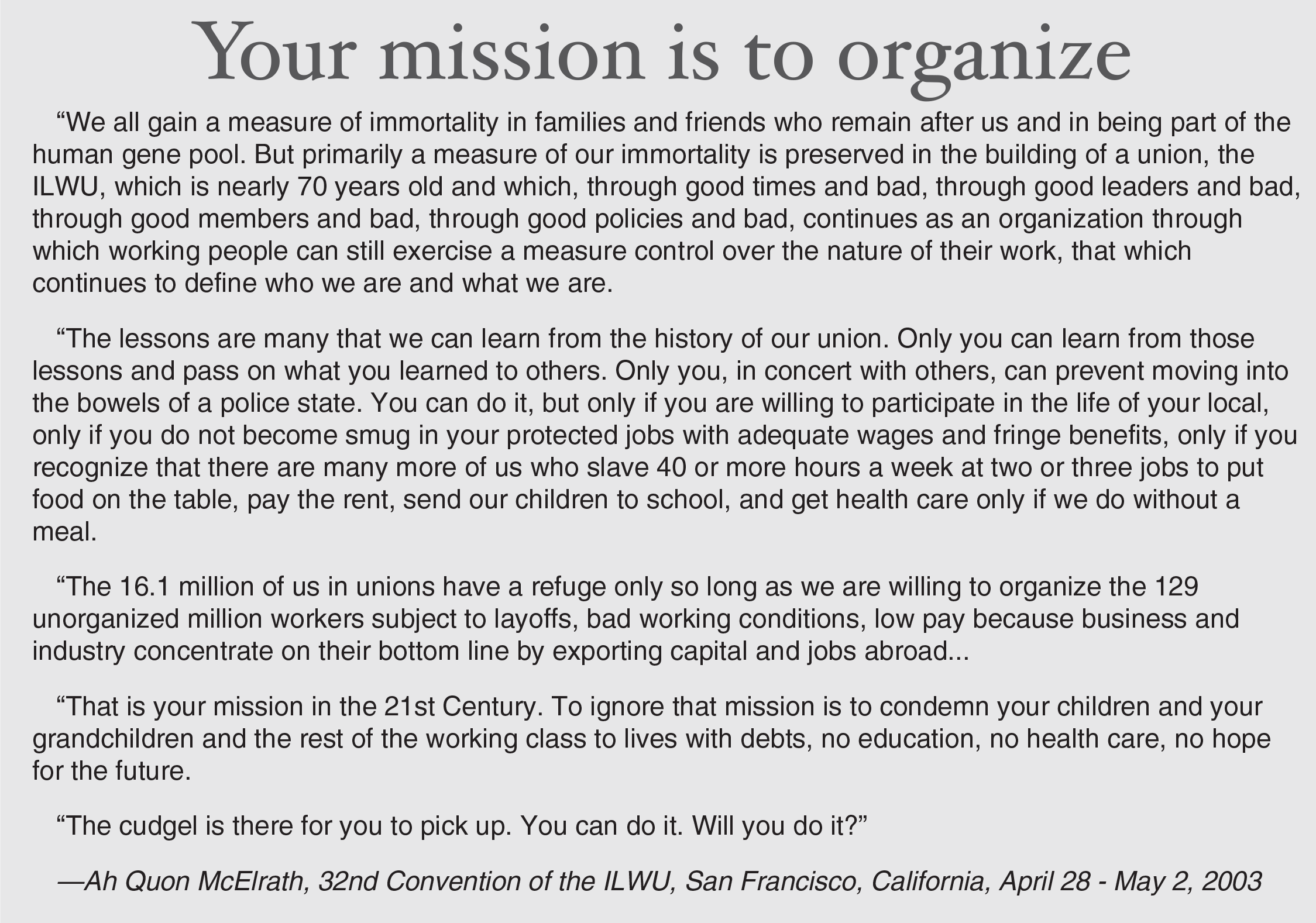
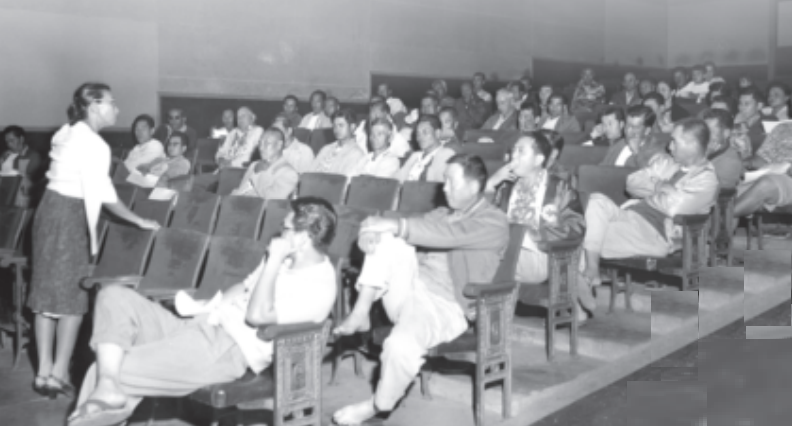
(Above) Ah Quon addresses Maui Pine workers in 1961.
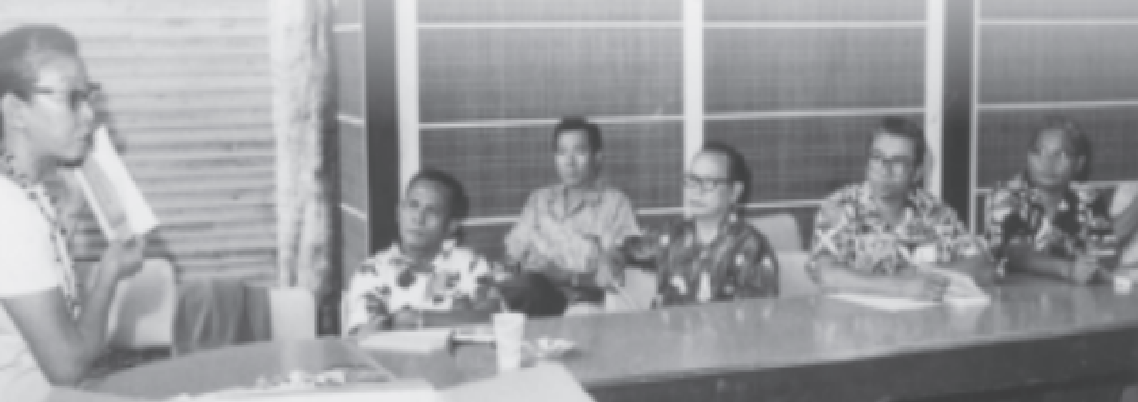
Conducting a workshop at the Kauai Division office in Lihue.

Testifying before the State Senate in 1961.
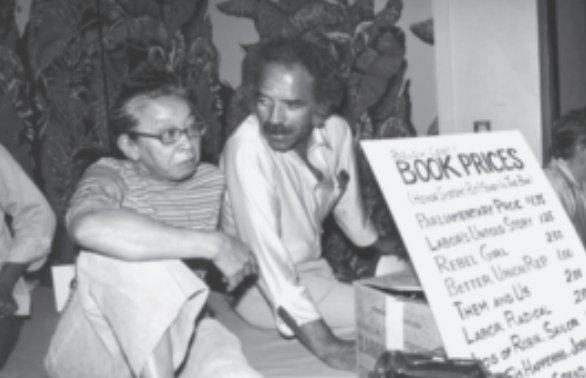
Ah Quon with ILWU International Vice President Curtis McClain.
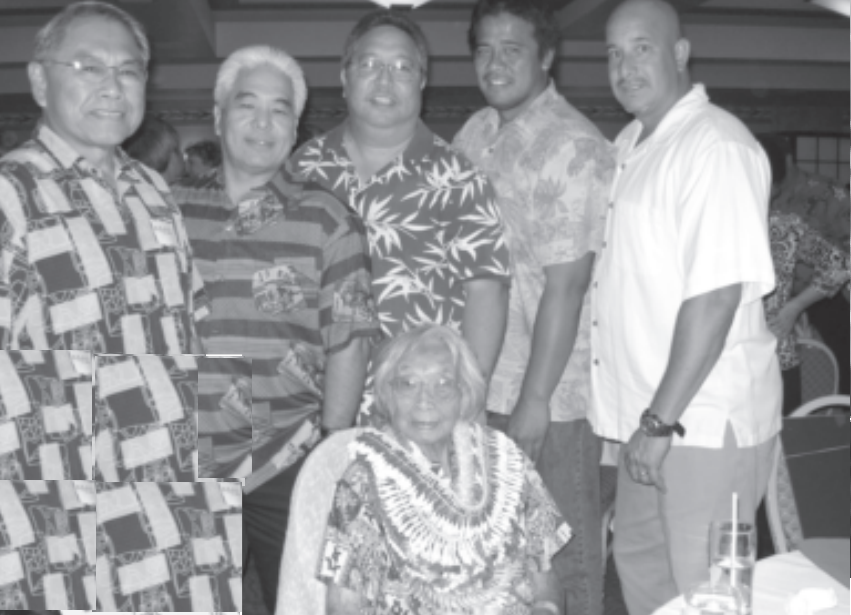
Ah Quon honored at a dinner held by The People’s Fund on November 1, 2008. (L-r) ILWU Local President Fred Galdones, Kenneth Ige of Unit 4412-Servco Pacific Inc., Oahu Business Agent Tyrone Tahara, Sean Dacuycuy and Dennis Morton of Unit 4201-Hawaii Stevedores.
Active in retirement
Ah Quon retired from the ILWU in 1981, but never retired from her lifelong mission of helping working people help themselves, of defending civil rights, and of advocating for fair treatment of the underprivileged.
In 1983, she attended the founding convention of the Nuclear-Free Pacific Community in Vanuatu where the people of many of the Pacific island nations came together to call for an end to nuclear waste dumping and nuclear bomb testing in the Pacific. Later that year, Ah Quon moved to Washington, D.C. to work with the Villers Foundations on national legislation on issues concerning the elderly.
On her return to Hawaii in 1985, she co-founded the Committee on Welfare Concerns which helped focus the previously separate lobbying efforts of individuals and organizations concerned with the elderly, welfare rights, the handicapped, civil rights, and social programs.
During many session of the Hawaii State Legislature, Ah Quon would camp out at the State Capitol and sift through hundreds of proposed bills, looking for proposals that would impact the lives of the poor and the elderly, erode civil rights, or increase the cost of living. Then she and the Committee on Welfare Concerns, an organization of individuals and 24 organizations which Ah Quon co-founded in 1985, would lobby lawmakers on behalf of and with poor men, women, and children. She sought most of all to establish a universal health care system that would cover everyone.
In 1998, Ah Quon fought for legislation that would allow for dying with dignity and doctor assisted death. She was instrumental in the formation of Governor Cayetano’s Blue Ribbon panel on Living and Dying with Dignity. She worked hard to promote greater public awareness of how current medical practices often prolong death, of the difficult choices faced by families and the individuals with terminal illness, and of the cost of dying with dignity.
Ah Quon was appointed to the Board of Regents of the University of Hawaii from 1995 to 2003 where she brought a unique perspective to the governing body of the University of Hawaii system. She was a strong and passionate advocate for students and faculty, serving as the chair of the Regent’s Academic Affairs Committee and Committee on Student Affairs.

Educate ILWU members
Ah Quon continued to educate ILWU members—both here in Hawaii and on the Mainland—about the union’s progressive history and the need for union members to work for peace and justice. She was a featured speaker at a number of ILWU conventions, pensioners confererences, at educational LEAD Institutes on the West Coast, and the Labor Institutes in Hawaii.
Ah Quon received recognition for her lifetime work in advancing the cause of working people, the poor, the elderly and the disadvantaged by numerous community organizations and groups, not only in Hawaii but nationally as well. She was recognized by the Asian Pacific Americans Labor Alliance, by Na Loio, the YWCA of Hawaii, the University of Hawaii School of Social Work, the Hawaii Institute for Public Affairs, the Hawaii People’s Fund, and many other organizations.
Ah Quon touched the lives of thousands of Hawaii’s people. Ah Quon passed away with dignity on Dec. 11, 2008, just a few days short of her 93rd birthday. She is survived by a daughter, Gail, a son, Brett, two grandchilden, one great-grand daughter, brotherAh Nee Leong and a sister Mabel Abili.
